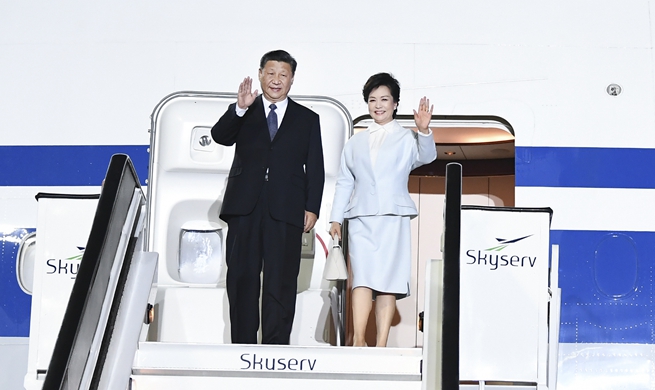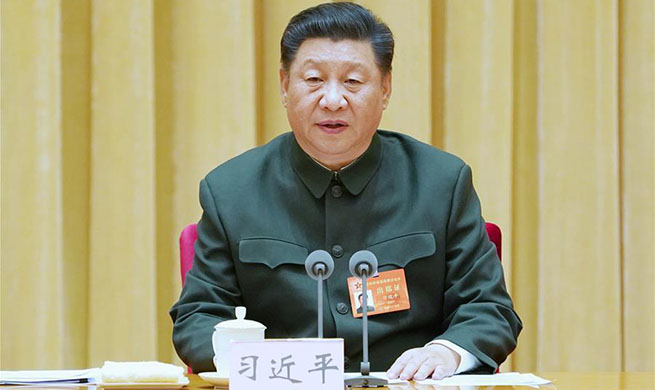By Xinhua Writers Bai Xu and Ren Liying
BEIJING/CANBERRA, Nov. 11 (Xinhua) -- Growing up in a family of ordinary workers in northeast China, Song Xiaolei had a wild dream in her childhood.
"I wanted to be an attorney like the ones I saw in movies from Hong Kong and overseas," she recalled. At that time, during school holidays, she would watch movies in a small flat after her parents left for work on bicycles.
While childhood dreams are dismissed by many as mere fantasy, Song managed to work step by step toward her own.
She chose to attend Jilin University for legal studies, before going to the UK to pursue her master's degree and doctorate.
Four years ago, Song turned down offers from several British companies and returned to China. She is now working in the Legal and Compliance Department of China Resources, a state-owned conglomerate that owns a variety of businesses across the country.
Although she is not an attorney, the 32-year-old is living the life she envisaged: in her big apartment of 120 square meters in the financial hub of Shenzhen, with a car and a decent job just as she once saw in the movies.
Song is among the young generation of Chinese who, after studying overseas, are seeing their dreams come true in their mother country.
CONFIDENCE IN THE FUTURE
In 2014, a major Ipsos MORI survey across 20 countries found that Chinese people are the most optimistic about the future.
According to the survey, 78 percent of young people polled in China felt their lives would be better than those of their parents, compared with 46 percent in India, 27 percent in the Republic of Korea, 26 percent in the United States and 22 percent in Britain.
Five years have passed, but the trend has not changed.
Xinhuanet conducted a similar survey in April. Of nearly 2,000 Chinese college students polled, more than 90 percent had confidence in China's future.
Yu Shasha, 29, received three job offers during her five-year stay in the Republic of Korea, but she turned them all down and came back to China.
"China is developing fast and a lot of industries are taking shape, providing many opportunities for people like me to realize dreams," she said.
"I have liked entertainment since when I was young. I felt like I seized a valuable opportunity in a rapidly-developing industry and my career prospect is more promising in China," said Yu, who now works in an entertainment firm.
A DIFFERENT GENERATION
"Our generation is different from our parents," said Pan Xiangyue, who studied at the Australian National University before coming back to China earlier this year.
"Our parents lived in a period when our country was poor, and it was their efforts and dedication that helped create the economic miracle," he said.
Living in a better-off environment, Pan said young people like him see things differently from their parents. "We grew up after the reform and opening-up," said the 25-year-old. "We witnessed the take-off of China's economy. The rapid development of our country gave us the confidence to have dreams and to realize them."
Simon Mander, senior partner with a firm providing Australian immigration advice, AMVS Legal, told Xinhua that young Chinese tend to be more reluctant to immigrate than people who are older.
Echoing Pan's view, he observed that social development was definitely an important factor. "In the 1990s when I was in Nanjing, I think the train ran about five hours into Shanghai. Whereas now you can live in Nanjing and work in Shanghai, and come back in the evening," he said.
In the past, Chinese people used to marvel at the convenience in Western countries, but now some young people would go so far as saying "we have got a higher level of technology than Australia", Mander said.
China's connection with the rest of the world has been strengthened in the decades after the opening-up, which has facilitated international business.
"China has made it easier for people to work and travel in the country," Mander said.
"My path to fulfilling my dream overlapped with our nation's path toward prosperity," said Song Xiaolei when talking about her decision to return from overseas. "This is the best route I could ever take."
MORE EMOTIONALLY ATTACHED
Apart from the convenience, both Song and Pan acknowledged that young Chinese nowadays are more emotionally attached to their mother country, and it was their dream to see China grow stronger.
This year marks the 70th anniversary of the founding of New China. Countless young people voiced their love for their mother country and added a national flag to their social media profile pictures.
Capitalizing on this upswell, "My People, My Country," a film recalling important historical moments in China over the past seven decades, raked in 2.86 billion yuan (about 407 million U.S. dollars) on the Chinese mainland.
The film fared well even in Canberra, a city with barely 400,000 people. During the premiere, those in attendance stood as one and sang the title song of the film.
Both Song and Pan said the outpouring of patriotism is voluntary, and they are absolutely not, like some media reports claim, "brainwashed."
"The Western world should not underestimate Chinese people's ability to judge," Song said. "Many young Chinese have received college education, and an increasing number of them have the chance to travel overseas."
"When I was overseas, I found that news reports sometimes didn't reflect our real lives and mentality," Pan said.
"For me, the Chinese dream reflects our pride and responsibility as Chinese," he continued. "We are no longer an impoverished and weak nation that can be bullied, and our next step is to change the bias of other countries."
(Xinhua writers Qiang Lijing and Zhu Qing contributed to the story.)

















